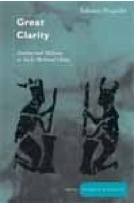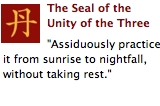External Alchemy (Waidan)
Methods
Translations on this page are reproduced from:
Great Clarity: Daoism and Alchemy in Early Medieval China
Fabrizio Pregadio
Stanford UP, 2006
Hardcover
This is the first book to examine extensively the religious aspects of Chinese alchemy. Its main focus is the relation of alchemy to the Daoist traditions of the early medieval period (3rd to 6th centuries). It contains full translations of three important medieval texts, all of them accompanied by running commentaries. Read more on this book.
Mysterious and Yellow (xuanhuang 玄黃)
The Yellow Emperor said: When you want to make the Divine Elixirs, you should always first prepare the Mysterious and Yellow (xuanhuang).
Method of the Mysterious and Yellow. Take ten pounds of quicksilver and twenty pounds of lead. Place them in an iron vessel, making the fire underneath intense. The lead and the quicksilver will breathe out their Essence and Flower (jinghua), which will be purple or like gold in color. Gather and collect it with an iron spoon. This is the Mysterious and Yellow; some call it Yellow Essence (huangjing), others Yellow Sprouts (huangya), and others Yellow and Weightless (huangqing). Place this Medicine in a bamboo cylinder, steam it one hundred times, and sublimate it with aqueous solutions of realgar and cinnabar.
![]() Book of the Nine Elixirs (Huangdi jiuding shendan jingjue, chapter 1). Translation published in Pregadio, Great Clarity, 164-65.
Book of the Nine Elixirs (Huangdi jiuding shendan jingjue, chapter 1). Translation published in Pregadio, Great Clarity, 164-65.
Mud of the Six-and-One (liuyi ni 六一泥)
[The Yellow Emperor] said: You should also prepare the Mud of the Six-and-One (liuyi ni).
Method of the Mud. Use alum, Turkestan salt, lake salt, and arsenolite, heating them first for twenty days; also use left-oriented oyster shells from Donghai,(1) red clay, and talc. Take the desired amount of these seven substances in equal parts, and pound them together ten thousand times until they become powder-like. Place them together in an iron vessel, and heat them for nine days and nine nights, making the fire underneath intense. When the Medicines take on a vivid scarlet color like fire, pound them again ten thousand times. Sift them through a piece of thin silk, and add them to a hundred-day Flowery Pond (huachi),(2) forming a mud.
When you start [compounding the elixirs], use this mud to lute a scarlet earthenware crucible holding eight or nine pints, or at most one peck. Smear the crucible with the mud both inside and outside, making each layer three tenths of an inch thick, and let it dry in the sun for ten days. Then take some white lead and heat it until it becomes golden. Place it in a hundred-day Flowery Pond with an equal amount of the Mysterious and Yellow prepared earlier. Lute [again] the crucible with this compound, both inside and outside, making each layer three tenths of an inch thick. Leave the crucible in the sun for ten days so that it becomes completely dry, whereupon you use it to sublimate the Flower of Cinnabar (danhua).(3)
(1) In present-day Shandong.
(2) An acetic bath used to soak the ingredients before they are used.
(3) The Flower of Cinnabar is the first of the Nine Elixirs.
![]() Book of the Nine Elixirs (Huangdi jiuding shendan jingjue, chapter 1). Translation published in Pregadio, Great Clarity, 166-67.
Book of the Nine Elixirs (Huangdi jiuding shendan jingjue, chapter 1). Translation published in Pregadio, Great Clarity, 166-67.
Elixir in Pellet (erdan 餌丹)
The Fifth Divine Elixir is called Elixir in Pellet (erdan). Take one pound of mercury, and put it in a crucible of the Six-and-One.(1) Then take one pound of Imperial Man (realgar), pound it until it becomes powder-like, and cover the mercury with it. Then take one pound of Leftovers of the Food of Yu (hematite), pound it until it becomes powder-like, and cover the Imperial Man with it. Close the crucible with another crucible of the Six-and-One, seal the joints luting them with the Mud of the Six-and-One, and let it dry.
Place the crucible over a fire of horse manure or chaff for nine days and nine nights. Extinguish the fire, and place the crucible over a fire of charcoal for nine days and nine nights. Extinguish the fire, let the crucible cool for one day and open it. The Medicine will have entirely sublimated, and will adhere to the upper crucible. It will be similar to frost and snow. Brushing with a feather, collect it, and add to it equal quantities of Grease of Dragons, and of Celestial Male (aconite) from Mount Shaoshi.(2)
After ingesting a speck of this elixir for thirty days, a chick will grow wings and become a flying immortal.(3) The ten thousand gods will become your attendants and offer protection, and the Jade Women will be at your service. The divine immortals will welcome you, and you will rise to heaven. The hundred demons, the Gods of Soil and Grain (Sheji), the Count of the Wind (Fengbo), and the Master of Rain (Yushi) will welcome you, and you will have them at your service.
(1) I.e., a crucible luted with the Mud of the Six-and-One, whose recipe is translated above.
(2) The commentary explains that the Grease of Dragons, longgao, is usually obtained by leaving seven worms under salt in a vessel. However, says the text, since killing small creatures for one's own benefit goes against the principles of benevolence (ren) and sympathy (ceyin), the term longgao can also be understood as xilong gao (Fat of the Western Dragons), which is a secret name of the dew collected on mulberry trees. — Mount Shaoshi is in present-day Henan.
(3) The growth of wings is a metaphor for the acquirement of immortality.
![]() Book of the Nine Elixirs (Huangdi jiuding shendan jingjue, chapter 1). Translation published in Pregadio, Great Clarity, 182-82.
Book of the Nine Elixirs (Huangdi jiuding shendan jingjue, chapter 1). Translation published in Pregadio, Great Clarity, 182-82.








